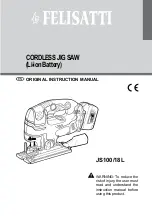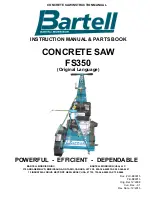
DANGER
•
Keep hands out of sawblade path.
•
Never cut anything freehand.
•
Never reach behind or beneath blade.
•
To avoid electric shock, do not expose to
rain.
•
Tighten arbor screw and all clamps before
turning power on.
4.Power Supply
Motor specifications
The AC motor used in this saw is a
conduction, nonreversible type having the
following specifications:
Maximum capacity (KW) 0.375
Voltage (V) 230
Amperes (A) 2.23
Frequency (Hz) 50
Motor speed (RPM) 1430
Earth
This metal saw is single insulated tool, so the
earth system is provided to protect you from
being shocked. The appropriate earthing
system is set up as soon as this machine is
plugged into the proper power supply system.
Therefore, the standard power supply system,
shall be provided for this machine in order to
protect you from the risk of shock.
DANGERA:
To avoid electric shock
1. Do not change the power cord and
plug into another specification
provided by the manufacturer.
2. Do not use in rain or where floor is
wet. This tool is intended for indoor
residential use only.
Motor safety protection
CAUTION:
To avoid motor damage,
this motor should be blown out or vacuumed
frequently to keep sawdust from interfering
with normal motor ventilation.
1. If the motor does not start, release the
trigger switch immediately. UNPLUG
THE TOOL. Check the saw blade to
make sure it turns freely. If the blade is
free, try to start the motor again, if the
motor still does not start, refer to the
“Motor Trouble Shooting Chart”.
2. If the motor suddenly stalls while cutting
wood, release the trigger switch, unplug
the tool, and free the blade from the wood.
Then you may restart the motor and
finish the cut.
3. Fuses may “blow” or circuit breakers may
trip frequently if:
a. Motor is overloaded-overloading can
occur if you feed too rapidly or made
too many start/stops in a short time.
b. Voltage not more than 10% above or
below the nameplate voltage can
handle normal loads, for heavy loads,
however, the voltage (caused by a
small size wire in the supply circuit or
an overly long supply circuit wire)may
drop too low for the motor to operate.
Always check the connections, the load
and the supply circuit whenever motor
does not work well. Check wire sizes
and length with the Wire Size Chart
below.
4. Most motor troubles may be trace to
loose or incorrect connections, overload,
low voltage (such as small size wire in
the supply circuit) or to overly long supply
circuit wire. Always check the
connections, the load and the supply
circuit whenever motor doesn’t work well.
Check wire sizes and length with the
Wire Size Chart below






































